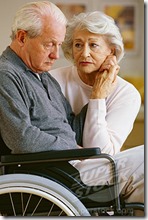 For Mary, it was when she began taking her dad to doctor visits. For Janice, it was when she began helping her mom in the bathroom.
For Mary, it was when she began taking her dad to doctor visits. For Janice, it was when she began helping her mom in the bathroom.
For John, it was when his parent’s overdrawn bank account forced him to start handling their financial affairs. For my sister, it was when my mom needed help showering my dad.
That’s when each one of them identified as caregivers.
Whether helping with personal care, running the household, assisting with financial transactions, managing medications, driving or helping an aging loved one to deal with escalating emotional or physical challenges, baby boomers are at the tipping point of the caregiving tidal wave.
According to the National Alliance for Caregiving, 1 in 3 American households includes a caregiver.
So why is it that many of those caring for an aging loved one don’t see themselves as caregivers but simply as “good children”?
Author Nancy Mattia says self-identifying as a caregiver can make a huge difference in how that role affects a person.
Caregivers who don’t see themselves as such often don’t get the help they need in caring for an aging loved one.
“Good children,” Mattia says, don’t connect with programs and services that could help them in their mission, which puts them and their loved ones at risk for not getting the help they really need.
On the other hand, adult children who do self-identify as caregivers often put all the responsibility on themselves and become at risk for poor health.
According to a recent UCLA study, middle-aged people who assume full caregiving responsibility are likely to see their own health negatively impacted by engaging in bad health behaviors like smoking, consuming fast food or being sedentary, as well as neglecting regular checkups and ignoring their own emotional well-being.
No wonder so many studies are being done on the caregiving experience—there’s still so much we don’t know. One fact on which all studies agree is that getting help is critical to the survival of the caregiver.
When a caregiver finally recognizes they need help, where do they go? Most often it’s to the Internet or to a friend who has been through a similar experience.
Both are great places to start, but very often expert guidance in planning for what’s coming next in the caregiving journey can be the most important information a caregiver can receive.
Caregivers need to explore all options before an emergency strikes. No one wants to help an aging loved one make important decisions when they and their loved ones are under stress.
Maybe you are preparing for the responsibility of becoming a caregiver or are in the midst of caring for an aging loved one. When it’s your turn to answer the challenge, how will you respond?
From 5:30 to 7 p.m. on Tues. Feb. 25, Senior Concerns will host “Helping Aging Loved Ones Thrive.”
This workshop will help participants determine what role they want to play in caring for an aging loved one.
Attendees will learn how to help seniors adapt to aging changes, the 10 signs aging loved ones need help, and the most important things to do when a senior is in crisis.
I’ll be leading the presentation along with Lori Bliss, one of our case managers.
Preregistration is required, so please call (805) 497-0189 to make reservations.


